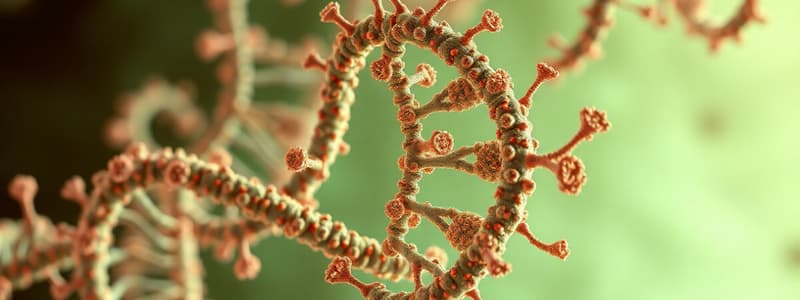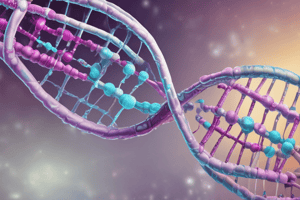Podcast
Questions and Answers
What is a primary role of miRNA in biological systems?
What is a primary role of miRNA in biological systems?
- Stimulating protein synthesis
- Regulating RNA interference
- Facilitating brain and heart development (correct)
- Promoting cell division
Which method is NOT used to analyze the phenotypic effects of RNA interference?
Which method is NOT used to analyze the phenotypic effects of RNA interference?
- Morphological analysis
- Centrifuge-based purification (correct)
- Northern blotting
- Growth curve analysis
What is a significant limitation of using dsRNA for gene knockdown?
What is a significant limitation of using dsRNA for gene knockdown?
- It results in complete gene deletion
- Not all cells effectively uptake the dsRNA (correct)
- It can induce mutations in other genes
- It has a slow degradation rate
What does the tetracycline operon achieve in the context of dsRNA production?
What does the tetracycline operon achieve in the context of dsRNA production?
Which of the following methods can be used to confirm the loss of target mRNA?
Which of the following methods can be used to confirm the loss of target mRNA?
Which phenomenon may occur if there is a lack of control in dsRNA production?
Which phenomenon may occur if there is a lack of control in dsRNA production?
What is the purpose of using stem-loop structures in RNA interference?
What is the purpose of using stem-loop structures in RNA interference?
What does vector-based RNAi utilize for generating siRNAs?
What does vector-based RNAi utilize for generating siRNAs?
What is the initial indication of RNA interference (RNAi) significance derived from?
What is the initial indication of RNA interference (RNAi) significance derived from?
Who are credited with the discovery of RNA interference?
Who are credited with the discovery of RNA interference?
What is the primary purpose of RNA interference in gene silencing?
What is the primary purpose of RNA interference in gene silencing?
What role does Dicer play in the RNAi pathway?
What role does Dicer play in the RNAi pathway?
What is the primary function of the RNA-Induced Silencing Complex (RISC)?
What is the primary function of the RNA-Induced Silencing Complex (RISC)?
Which method is typically used to assess the knockdown efficiency in an RNAi experiment?
Which method is typically used to assess the knockdown efficiency in an RNAi experiment?
Which characteristic is true about small interfering RNAs (siRNAs)?
Which characteristic is true about small interfering RNAs (siRNAs)?
What distinguishes vector-based RNAi from siRNA-based approaches?
What distinguishes vector-based RNAi from siRNA-based approaches?
What distinguishes miRNA from siRNA?
What distinguishes miRNA from siRNA?
What is the role of the T7 polymerase in opposing T7 RNAi?
What is the role of the T7 polymerase in opposing T7 RNAi?
Why is RNA interference (RNAi) considered useful in research?
Why is RNA interference (RNAi) considered useful in research?
How does conditional RNAi, particularly the Tet on/off system, function?
How does conditional RNAi, particularly the Tet on/off system, function?
Why are lentiviral vectors used for delivering RNAi constructs in mammalian cells?
Why are lentiviral vectors used for delivering RNAi constructs in mammalian cells?
What are the typical features of small interfering RNAs (siRNAs)?
What are the typical features of small interfering RNAs (siRNAs)?
Which of the following describes hairpin-based RNAi?
Which of the following describes hairpin-based RNAi?
What is a common application of RNA interference technology?
What is a common application of RNA interference technology?
What makes ZFN technology advantageous despite its longer production time?
What makes ZFN technology advantageous despite its longer production time?
What is a characteristic of Non-Homologous End Joining (NHEJ)?
What is a characteristic of Non-Homologous End Joining (NHEJ)?
How do TALENs compare to ZFNs in terms of production time?
How do TALENs compare to ZFNs in terms of production time?
What is the purpose of using a repair template in Homology-Directed Repair (HDR)?
What is the purpose of using a repair template in Homology-Directed Repair (HDR)?
What is a significant challenge in genome editing related to delivery methods?
What is a significant challenge in genome editing related to delivery methods?
What is one of the primary treatments for sickle cell disease and β-thalassemia?
What is one of the primary treatments for sickle cell disease and β-thalassemia?
What role do helper plasmids play in AAV production?
What role do helper plasmids play in AAV production?
Which of the following describes the functionality of CRISPR-Cas9 in DNA insertion?
Which of the following describes the functionality of CRISPR-Cas9 in DNA insertion?
What is a consequence of iron overload in sickle cell disease?
What is a consequence of iron overload in sickle cell disease?
What is the primary function of antisense DNA in treating Duchenne Muscular Dystrophy (DMD)?
What is the primary function of antisense DNA in treating Duchenne Muscular Dystrophy (DMD)?
How are AAV vectors classified once produced?
How are AAV vectors classified once produced?
Which mechanism is involved in immune recognition of AAV?
Which mechanism is involved in immune recognition of AAV?
What is a significant mutation characteristic of Becker Muscular Dystrophy?
What is a significant mutation characteristic of Becker Muscular Dystrophy?
Flashcards are hidden until you start studying
Study Notes
RNA Interference (RNAi)
-
Classical RNAi discovery: Plant studies showed that excessive RNA expression of the chalcone synthase gene unexpectedly reduced color pigment. Leading researchers to understand that overlapping RNA sequences formed dsRNA. Cleavage of dsRNA into siRNAs led to mRNA degradation and gene knockdown.
-
Key Players in RNAi: Andrew Fire and Craig Mello, who contributed significantly to understanding RNAi, demonstrating its ability to silence genes using dsRNA in nematodes.
-
Dicer: An RNase III endonuclease that cleaves long dsRNA into siRNA fragments (21-23 nucleotides) with 2-nucleotide 3' overhangs.
-
RISC (RNA-Induced Silencing Complex): A multiprotein complex that incorporates one strand of the siRNA (guide strand) and facilitates base pairing with complementary target mRNA. Argonaute within RISC mediates the degradation of the target mRNA.
-
Small Interfering RNA (siRNA): 21-23 nucleotides long with 2-nucleotide 3' overhangs, derived from dsRNA cleavage. Essential for sequence-specific degradation of target mRNA.
-
miRNA vs. siRNA:
- miRNA (microRNA): Noncoding regulatory RNAs, usually single-stranded with hairpin structures. Processed by Dicer and play roles in regulating gene expression.
- siRNA (small interfering RNA): Derived from long dsRNA, primarily involved in the degradation of complementary mRNA.
-
Key Features and Applications of RNAi:
- Sequencespecific gene silencing
- Target and degrade specific mRNA
- Cross cell barrier effects
- Potential therapeutic applications
- Functional genomics
- Gene knockdown studies
- Development of RNAi-based therapies
-
Performing an RNAi Experiment:
- Design and synthesize specific siRNAs targeting the gene of interest.
- Introduce siRNAs into cells using transfection methods.
- Assess:
- mRNA levels (qRT-PCR)
- Protein levels (Western blotting or ELISA)
-
Vector-Based vs. siRNA-Based RNAi:
- Vector-based: Uses plasmids or viral vectors to express shRNAs, which are processed into siRNAs within the cell.
- siRNA-based: Direct introduction of chemically synthesized double-stranded RNA molecules that can immediately integrate into RISC.
-
Opposing T7 vs. Hairpin-Based RNAi:
- Opposing T7: Two promoter regions (T7) in opposite directions generate dsRNA from sense and antisense strands.
- Hairpin-based: Single promoter drives transcription of an RNA construct that forms a hairpin structure, which is processed by Dicer.
-
Conditional RNAi, Tet on/off System:
- Regulates the expression of RNAi constructs.
- Tetracycline operator regulates T7 polymerase activity, controlling transcription of the target RNA in response to tetracycline presence.
-
Lentivirus and RNAi in Mammals:
- Lentiviral vectors deliver RNAi constructs into mammalian cells for stable, long-term gene silencing.
- They infect both dividing and non-dividing cells, making them promising tools for RNAi-based therapies.
Genome Editing
-
AAV (Adeno-Associated Virus) Transduction: Enters cells in the same way as B cells encounter an antigen. It evades lysosomes and enters the nucleus for self-replication and integrates its DNA into the host cell.
-
AAV Production:
- Plasmid Transfection: Three plasmids are introduced into HEK293 cells:
- Helper Plasmid: Contains adenovirus genes for viral functioning.
- Rep/Cap Plasmid: Encodes AAV replication (Rep) and capsid (Cap) proteins for viral assembly.
- Transgene Plasmid: Contains the gene of interest flanked by AAV sequences.
- HEK293 cells are co-transfected with the plasmids.
- Harvesting AAV: AAV is separated by centrifugation in a 60% Iodixanol solution with varying densities. AAV supernatant will divide based on size and weight, allowing for collection of the virus.
- Plasmid Transfection: Three plasmids are introduced into HEK293 cells:
-
AAV Receptor Binding: Naturally occurring or designed receptors can enhance viral engulfment.
-
AAV Immune Response: PRRs (Pattern Recognition Receptors) can recognize the virus, initiating an immune response to kill the virus or infected cells. (e.g., TLR, RLR)
-
AAV Applications:
- Chimpanzee AAVs used in COVID-19 vaccines to carry the spike protein.
- Gene therapy for muscular dystrophy, like using antisense DNA to skip mutated exons in DMD.
-
Genome Editing Tools:
- CRIPR-Cas9: Guide DNA binds to a specific site, and Cas9 cleaves the DNA. Quick but prone to off-target binding.
- ZFN (Zinc Finger Nucleases): Engineered proteins with zinc finger domains for specific DNA sequence binding and a FokI nuclease domain to cut DNA. Accurate but slow to produce.
- TALEN (Transcription Activator-Like Effector Nucleases): Use TALE proteins for DNA sequence recognition and a FokI nuclease for cutting. More precise and quicker to develop than ZFNs.
-
DNA Repair Mechanisms in Genome Editing:
- NHEJ (Non-Homologous End Joining): Directly joins broken DNA ends, often resulting in small insertions or deletions.
- HDR (Homology-Directed Repair): Uses a repair template with similar sequences to repair the break precisely.
-
First CRISPR-Cas9 Gene Editing Therapy: Leber congenital amaurosis type 10, a rare blindness caused by a CEP290 gene mutation.
- Editas and Allergen developed EDIT-101 (AGN-151187) gene therapy using an AAV5 vector to deliver Cas9 and guide RNAs, aiming to restore CEP290 protein production in photoreceptors.
-
Barriers to Genome Editing:
- Delivery Challenges: NPs (nanoparticles) containing proteins, RNA, and DNA for delivery can be susceptible to phagocytosis, degradation, and extraction. They can also trigger immune responses.
- Delivery Methods:
- In vitro nucleus cell injection (cells in culture)
- Injection into embryos followed by electroporation.
Studying That Suits You
Use AI to generate personalized quizzes and flashcards to suit your learning preferences.




